
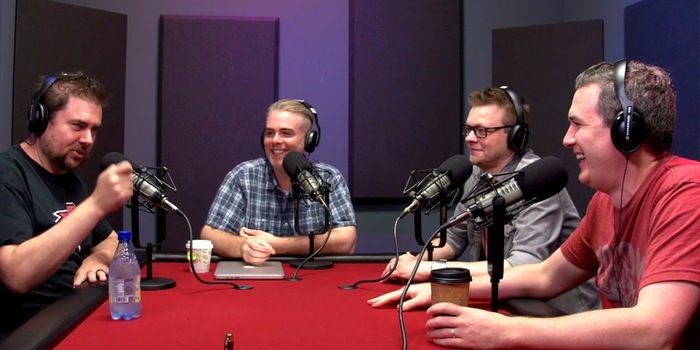
Recording a podcast - it couldn't be easier
Podcasts grow like weeds. OK, that's not really a good comparison. What I'm saying is that podcasts are a great thing and it's no wonder everyone's getting into them. Would you like to add your own voice to a topic that's close to your heart? Then I'll show you how to record your own podcast and what equipment you need.
Podcasts have been around for over 15 years. The boom began in 2005 when Apple jumped on the bandwagon and immediately made the term its own with the iPod. Since then, audio articles have been available on iTunes, of course, but also on many other platforms. And the range has expanded massively, with podcasts now available on everything and anything. From relationship advice to comedy to anatomical studies, not to mention music titles, there's something for everyone.
There will always be more, the trend is on the rise and is not about to stop. In the US, between 2015 and 2016, the number of podcast listeners increased by 25%. In Germany, one in seven people listen regularly to podcasts (article in German). A good reason to get in on the act too and record your own. Before we talk about the equipment, a few words about the content.
Preparation
Your commitment

Source: Flickr/Patrick Breitenbach
Before you start anything, make sure it's really what you want. A podcast only makes sense when you start doing it regularly. It takes time and commitment from you and your co-moderators. One thing's for sure: only a few people master solo shows.
Subject
Choose a theme. It can be games, music, one of your hobbies. But it can be many other things too. The more passionate you are about the subject you choose, the more interesting your podcast will be for listeners. After a while, it's only natural that you'll specialise in one area.
Length and format
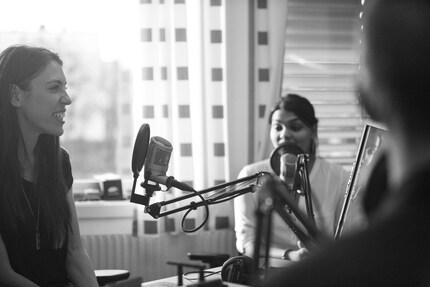
Podcasts come in all shapes and lengths. 30 minutes, 3 hours, anything is possible. An hour is a good length to start with, but not everyone has that much time to spare, whether it's you as a producer or your future listeners. The longer a podcast goes on, the harder it is to captivate listeners to the end. What's more, the longer the recording, the more time you need to set aside for processing it afterwards.
It's up to you whether you want to use a podcast or not. It's up to you whether you want to use a script or not. But it is advisable to follow a predefined thread. If you're doing a film review, you can start by talking about the content, then give your opinion.
Planning
When do you want to make the recordings? Where? Is it always the same people taking part? If not: are there other people who could be involved? This question should not be underestimated, as not all participants attach the same importance to the project. A weekly rhythm is ideal. A podcast every fortnight or one a month can also work. The longer there is between two podcasts, the greater the risk of it falling into oblivion.
Hardware
If everything is clear for the content, you can get started. For a podcast, you don't really need much. It depends on the sound quality you want. Theoretically, you can record everything with your mobile phone, but that's certainly not what you want to read. One thing's for sure: you don't necessarily have to spend a fortune.
Microphone
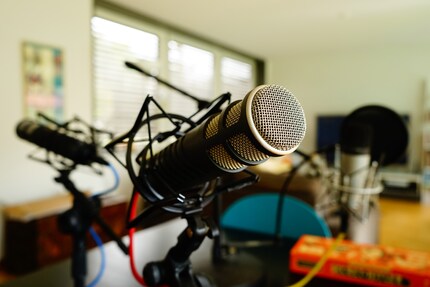
The basics are the microphone. If you're just starting out, I'd advise you to first opt for a cheap USB mic. You can plug it straight into your laptop and get started. Make sure that the sound is well recorded on all sides. One device is enough, even if there are several of you. But there are also advantages to each podcaster having its own microphone. You then benefit from several audio tracks that you can mix individually afterwards. There's also less noise, as people speak closer to the mic.
Later, you can always buy a better microphone or several microphones, fitted with analogue XLR connectors. To do this, you'll need an additional recording device.
A good entry-level unit, also available with suspension that protects against vibration
My current mic: it doesn't need suspension and filters out other speakers very well
Recording equipment
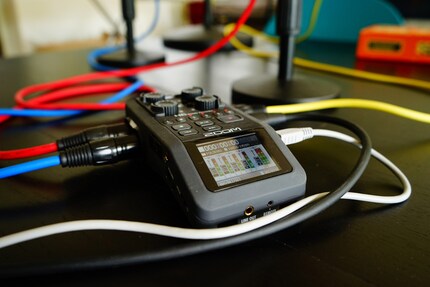
The simplest solution is to use a USB microphone and connect it directly to a computer. With the right software (next point), you'll be able to record the podcast directly. If you have several microphones or want to work with XLR, you need a mixer between the computer and the microphone. What I can recommend: the Zoom H6. A portable recording device that runs on batteries or mains power.
Software
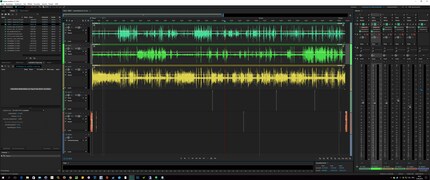
The best-known software is Audacity. It costs nothing and is very easy to use. It lets you listen directly to your recordings or imported audio files. At the end, you simply export your podcasts as Wave or MP3 files - depending on which platform you want to download them to later.
I tried a few different programs and finally settled on Adobe Audition. I like its usability and functionality. Unfortunately, though, it's not cheap.
If you're a student, Adobe Creative Cloud is considerably cheaper
Put it online
Your podcast is finished and you need to publish it. There are various providers that are free as long as you respect a certain data transfer limit. Personally, I use Soundcloud and now have a pro account there, as you can't find the old footage otherwise.
Once you've uploaded your podcast, all that's left to do is submit it to the various platforms. The most famous remains of course iTunes, but also think about Google Music, Stitcher, Miro, Soundcloud, Poddirectory and Blubrry. You only need to register your podcast once per RSS feed. Registering with the various services ensures that your podcast can be found on specialist channels and podcast apps.
Advertising
Once your masterpiece is on a channel, you need to advertise. Tell all your friends and acquaintances about it. Share it on Facebook, Twitter, Snapchat, etc. You can also collaborate with someone who does the same thing as you or invite different people. Only those who put their heart and soul into it will succeed.
My recommendations
The easiest way to find inspiration is to listen to a number of podcasts. Here are a few of my favourites.
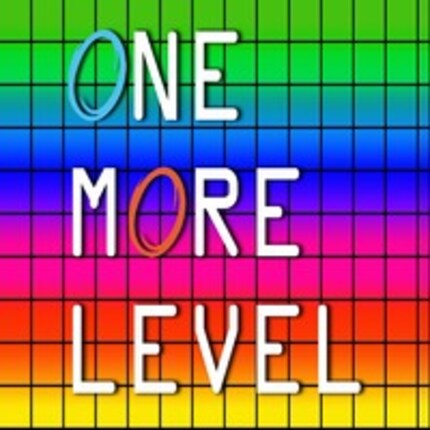
One More Level - we can do a bit of surreptitious advertising, so here's my own special gamers podcast. Here you can check whether or not I'm applying the advice I gave you above (in German).

Giant Bombcast - one of the most famous video game special podcasts, with lots of humour and knowledge. They also sometimes manage to talk about Cornflakes for 30 minutes.
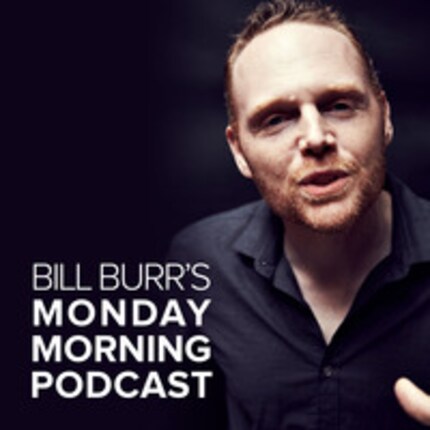
Bill Burr's Monday Morning Podcast - a famous American comedian who manages to entertain us single-handedly.
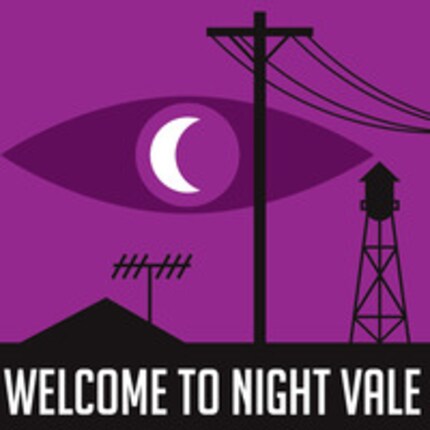
Welcome To Night Vale - it doesn't always have to be a debate. Welcome To Night Vale is a fictional radio station, reporting on particular events in the town of the same name.
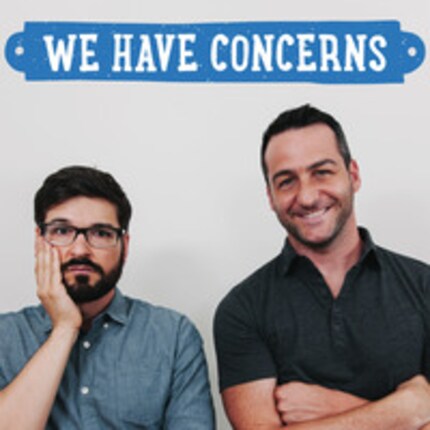
We Have Concerns - in this podcast, two moderators draw on curious news stories to invent funny scenarios.
As a child, I wasn't allowed to have any consoles. It was only with the arrival of the family's 486 PC that the magical world of gaming opened up to me. Today, I'm overcompensating accordingly. Only a lack of time and money prevents me from trying out every game there is and decorating my shelf with rare retro consoles.
Interesting facts about products, behind-the-scenes looks at manufacturers and deep-dives on interesting people.
Show all



